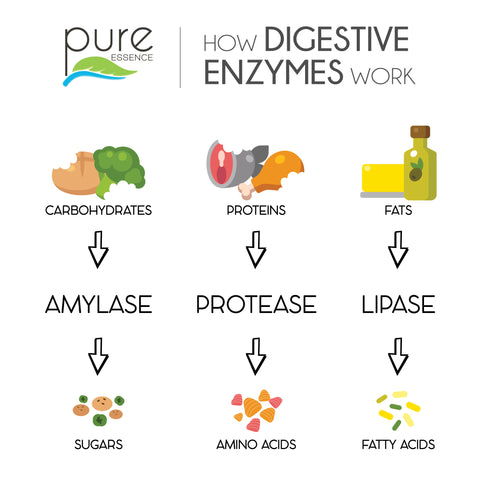If you’re following the Keto diet, and experiencing side effects, you’re not alone! Eating a high fat, low carbohydrate diet can cause a number of gastrointestinal symptoms and challenges. Luckily there are solutions.
Symptoms of low digestive enzymes

If your body is low or deficient in digestive enzymes, you can expect to experience one or more of the following symptoms:
- Indigestion or acid reflux after eating
- Belching
- Bloating
- Constipation
- Chronic fatigue or lack of energy
- Diarrhea
- Gas
Many people who eat a Keto diet have the above-mentioned symptoms ranging anywhere from days to even months. In many cases they eventually disappear after your body adapts to the drastic change in your diet. However, if you want immediate help, you’re in the right place because we have some practical suggestions on how you start feeling better right away.
The first step is to take a digestive enzyme supplement.
What are digestive enzymes?
Enzymes are substances that work to speed up (catalyze) chemical processes in the body. Digestive enzymes break down macronutrients (i.e., proteins, fats, carbohydrates) into their smallest parts. This breakdown is necessary because
it allows the nutrients from foods to be absorbed into the bloodstream, where they are transported to cells throughout the body to all your life processes.
Numerous digestive enzymes help with the digestive process. For example:
- Carbohydrases, which digest carbohydrates, are secreted by the pancreas and salivary glands located in your neck and mouth. Overall, digestion of carbohydrates requires the participation of more than a dozen enzymes, some of which are amylase, to break down starches, lactase (which breaks down the sugar [lactose] found in milk, cheese, and other dairy foods), maltase, and sucrase.
- Lipase, which breaks down dietary fats is produced by the pancreas, mouth, and stomach.
- Proteases, which break down proteins into amino acids, are made in the stomach and pancreas, and include carboxypeptidase A and B, chymotrypsin, pepsin, and trypsin.

Diets are highly individual and there are scores of different dietary approaches. Just take a quick look at the diet section in a bookstore and you’ll see what we mean.
Despite the vast number of options, researchers have determined that dietary patterns typically fall into one of nine different macronutrient profiles. At the same time, they’ve found a way to develop supplements that can provide the
enzyme activities that are required to break down the meals from each type of eating plan. This personalized approach enables you to use the precise blend of enzymes you need to digest your meals, meaning that they will help you to better access and utilize the nutrients from your food while also preventing the symptoms of digestive inefficiency. It’s like having a complete enzyme system built just for you!
How do enzymes work?
Did you just smell a freshly baked apple pie? Are you preparing dinner for your family? Did you see a commercial on TV for a delicious pizza? Are you eating breakfast while reading this article? In each of these situations, digestive enzymes can kick into action, whether you actually eat something or not. When we see, smell, or taste food, the number of digestive enzymes that the body secretes rises.
Digestive enzymes are secreted in your salivary glands, stomach lining, pancreas, and small and large intestines. Which enzymes are released and when depend on the macronutrients your meals contain. However, the reality is that we produce fewer digestive enzymes as we age, so that digestive distress is common even if we’re not changing dietary habits.
The Keto diet
Because Keto meals are so high in fat and low in carbohydrates, your body needs an enzyme blend that differs dramatically from those demanded by other eating plans. Vegetarian and vegan diets or a Mediterranean program, for example, are much lower in fat and higher in carbs, and contain far less cholesterol and saturated fats.
Therefore, it’s vital to have high levels of lipase, the main enzyme that breaks down dietary fats. Lipase metabolizes fats into glycerol (a simple sugar alcohol) and fatty acids. The lipase for these processes comes primarily from the pancreas but also from the mouth and stomach.
Health benefits of taking digestive enzymes for Keto diet
Okay, so here are just a few benefits of taking specialized digestive enzymes:
- Energy: There’s a good chance you’ll experience more energy because your body is better able to break down and absorb nutrients from your food.
- Immune Support: Since 70-80% of our immune system tissues are in our digestive system, an improved gut means improved immunity. They’re closely linked.
-
Decreased Digestive Stress: Since your body is under less stress because it doesn’t need to produce extra enzymes to handle the higher levels of fat intake associated with the Keto diet, your body won’t
have to work so hard to digest your high fat foods. Using enzyme supplements allow the body to utilize the digestive enzymes it makes to support other bodily functions. - Feel Better: Not only will you feel great because you’ll no longer suffer from the symptoms associated with having an insufficient level of digestive enzymes, but you’ll also have more energy, less inflammation and better digestion.
-
Building up your “enzyme bank.” Researchers believe that we can make only so many enzymes in a lifetime. The faster we use them up, the shorter our lifetime will be. When you use a digestive enzyme supplement, you spend far fewer of your own enzymes in the digestive process. That leaves more for other purposes, which could translate into in countless benefits.
How to buy a Keto digestive enzyme supplement

One thing virtually all digestive enzyme supplements on the market have in common is that they are “one-size-fits-all.” In other words, one generic product is supposed to be equally beneficial for everyone, no matter what they eat. This is simply not possible.
Your body is smart; it knows which enzymes it needs and how many of each is required to break down the foods you ingest. Everyone is better served by having an enzyme supplement designed to digest the foods they actually eat.
Therefore, if you want a digestive enzyme that can do the whole job while you’re following a Keto diet, here are a few recommendations:
- Buy a product that is specifically for the Keto diet.
- Look for a supplement that provides numerous types of proteases, lipases, and amylases. This is important because many different digestive enzymes have specialized actions and you want to be sure you cover all of them.
- In addition to proteases, lipases, and amylases, you also want a product that has other enzymes, such as beta-glucanase, invertase, maltase, pectinase, and phytases.
- Choose a supplement that provides some acid-stable protease enzymes that work even in the high acidity of the lower stomach.
- Make sure your supplement provides 10,000 FIP units of lipase.
It may not be easy to remember all of these so just snap a photo with your smartphone of the above five bullets and reference when you’re shopping to buy a digestive enzyme product.
The best way to optimize digestion and maximize the nutritional value of foods while on a Keto diet is to fuel your body with a personalized digestive enzyme supplement like Real-Zymes Keto from Pure Essence.

